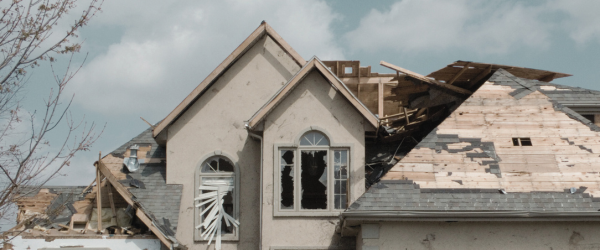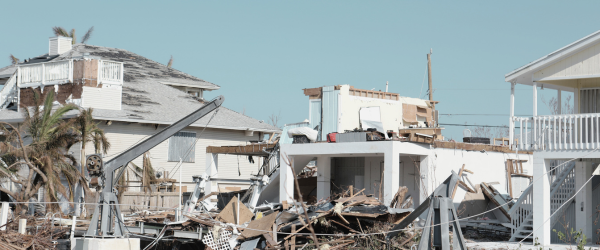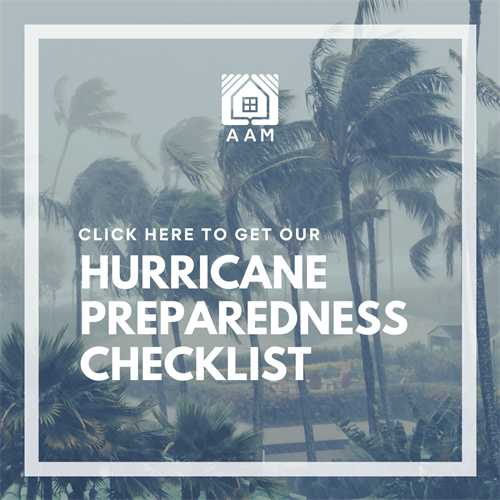Articles
HOA Hurricane Preparedness
Hurricane season officially begins on June 1st and runs through November 30th. Unlike a tornado that can strike a community with little warning, hurricanes often develop over weeks, giving homeowners associations (HOAs) crucial time to focus on HOA Hurricane Preparedness. However, without proper planning, the devastation from a direct landfall can leave lasting impacts for years, much like the aftermath of a sudden tornado.

Why does an HOA need to have a Hurricane Preparedness Plan?
It is part of an HOA’s duty to protect their community’s well-being and act in their residents’ best interest. Although having a Hurricane Preparedness Plan will certainly not save your community from being hit by a hurricane, it will assist your association and residents be prepared when the time comes. Ultimately, having a plan will help minimize health, safety, and monetary risks for the entire community.
Roles the HOA plays in preparedness:
Creating a Hurricane Preparedness Plan
It is essential for associations, especially those in states prone to hurricanes, tornadoes, and other natural disasters, to review their emergency preparedness plans periodically. Keeping residents informed and prepared for these situations is equally important. An emergency preparedness plan should already exist for your HOA. However, it’s crucial to revise and update it as needed. We recommend discussing updates to the plan during your HOA’s annual meetings. Creating one should be your top priority if your association does not yet have a plan. For assistance, contact your management company or AAM today.
Conducting Regular Inspections and Maintenance
As part of your HOA’s responsibility to protect the community, your association or management company should regularly inspect shared facilities. This includes roofs, windows, landscaping, mechanical equipment, and other communal assets. Regular inspections help identify potential safety hazards and assess necessary changes to buildings or infrastructure before a storm. For insurance purposes, it is also recommended to videotape or photograph community assets and common areas while they are in good condition. Ideally, these images should include time and date stamps.
Keeping Everyone Informed
Keeping residents and staff informed during uncertain situations is vital. Residents expect answers, and your HOA must be prepared to provide them before, during, and after an emergency.
Before hurricane season, share a digital copy of your Hurricane Preparedness Plan with residents and staff. Use emails, flyers, and your community website to share key information. This should include details about hurricane season, how to prepare, how the association will handle certain situations, and what to do during and after a hurricane.
For example, residents may be required to secure trash cans and backyard furniture to prevent significant property damage. Your HOA should ensure all residents know this policy and the penalties for noncompliance. Additionally, be ready to share local government updates, such as voluntary or mandatory evacuation notices.
Post-Storm Cleaning and Repairing
After the storms have passed, your HOA must conduct a damage assessment tour of the community’s common areas. The HOA should contact the appropriate vendors to clean and repair the damage.

What is included in an HOA Hurricane Preparedness Plan?
A Hurricane Preparedness Plan will serve as a guide for your HOA, specifying protocols and procedures. The following are items that you should include in your HOA’s Hurricane Preparedness Plan:
Hurricane Supply Kits
Provide your residents with a list of essential items or supplies they need to have handy before and whenever a storm is approaching. Important things include cash, personal documents, non-perishable food, water, clothing, medications, personal hygiene items, a fully charged cell phone, etc.
Roles and Responsibilities
Specify the roles and responsibilities of the HOA before, during, and after the emergency. For instance, what will the association communicate to residents, and what mediums will be used? Text messages, emails, community website? Similarly, specify what is expected from the residents to preserve their safety and the community’s safety.
Standard Protocols
Share a list of standard procedures for different situations. For example, what should be done if water or electricity are shut off, flooding occurs, or if the government issues an evacuation notice? Evaluate all the potential situations residents might be exposed to and determine the safest action plan for them. Remember, not everyone has experienced hurricanes before. What may seem like an obvious solution to some might not be apparent to others.
Site Plan
Include a site plan or map pointing out critical areas in the community and access to water valves, lift stations, generators, etc. Sometimes, local officials instruct communities in the most threatened areas to turn off electricity, gas, and water before evacuating.
Evacuation Plan
Establish a detailed evacuation plan, including a map highlighting emergency exits, evacuation paths, nearby shelters, gas stations, and drugstores.
Instructions for Re-entry
If an official evacuation notice has been issued, advise residents to be patient and not to re-enter unless state/county officials have allowed doing so. Your residents must stay updated with the latest news from the most reliable sources, and your HOA could help by providing a list of the most dependable sources of information.
Emergency Contact Information
Provide a list of all-important contacts, including your HOA Board members, Community Manager, insurance providers, relevant vendors, and other emergency services. It’s essential that your HOA also has access to all residents’ contact information and home addresses.

How can AAM help prepare your community?
AAM has plenty of experience preparing a community for a storm. With community partners through the Carolinas, 80% of the communities we serve are on the coast and could be impacted by every gulf or Atlantic storm. From those experiences, we can build a plan for each community that covers Pre, Mid, and Post Storm.
Working with local authorities and the Board of Directors, our preparation and execution of the personalized plan for the community mitigates damage and sometimes saves lives. In addition, we can work with the Board and their CERT (Community Emergency Response Teams) on planning, preparation, drills, and execution to preserve the common properties and ensure that all owners heed the warnings and prepare for their safety.
Our ability to work with our Preferred Vendors on the staging protocols ensures our team can have the workforce available when others may be stretched for help. This also enables our management professionals to focus on residents’ immediate needs and concerns to prepare for recovery once the storm has passed.
Does your current management company have a plan for you? If not, give us a call and let AAM build a plan for your community.
